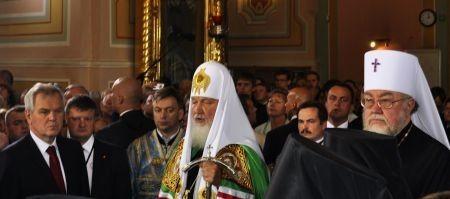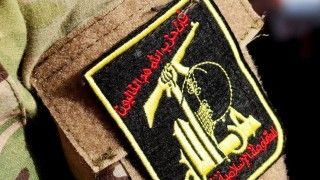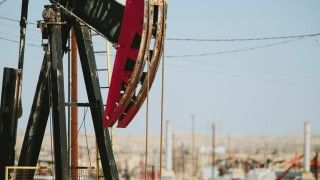- WIADOMOŚCI
- ANALIZA
Syria - Key To The Russian Political Offensive
Defeating the IS is not the main aim of the Russian armed involvement in Syria. Moscow is focused on its strategic goals, namely getting out of the political trap by re-establishing cooperation with the Western Europe and the United States. Secondly, the Kremlin would like to get back its influence in the Middle East. At the moment, Russia seems to consequently realize its goals, which is even easier in the light of the fact that the Western-European politicians are completely lost, since they are not in possession of skill, nor will, to start a decisive game – as Robert Czulda, PhD notes in his analysis for Defence24.pl.
If the West was willing to push the Russians into the corner, then this plan turned out to become a total fiasco. The United States and Barrack Obama are completely lost and incapable of taking any reasonable steps, while the Western Europe is still trying to comprehend the scale of its problems. However, instead of analysing the existing situation, the “Old Europe” is unable to create clear and implementable policy towards Syria, or towards the immigration crisis, or even towards the growing problem related to the armed Islam – with the latter issue being – at the moment – undeniable. At the same time, Russia, the fall of which was expected throughout the last months in the light of the international sanctions, is slowly changing its stance, into an offensive position. Syria is the key to the Russian great strategic game. Syria is the only ally of Russia within the Levant region, and second ally (besides Iran) in the Middle East.
What is Russia fighting for?
The Syrian operations are going to turn out to be beneficial for the Russians within a variety of areas. Above all, not only is Russia going to break the encirclement formed by the European nations and by the US, showing that the sanctions did not bring Russia to its knees, but it is also going to present the fact that Moscow is stronger than ever. For Russia, these steps also constitute an attempt of breaking the deadlock in the relationship with the Western Europe, which was created as a result of the Ukrainian crisis. Nobody mentions the Crimean Peninsula or Donbas in the Western Europe any more. This thread is disregarded by anybody located West of the Oder. By conducting strikes against the forces who are the enemies of the al-Assad’s government, Putin seems to have become a defender of the European values, a natural partner who needs to be dragged towards a partnership with the West, and who cannot be ignored due to the “exotic” problems, such as the Ukrainian crisis. Putin is perfectly aware of the Western attitude, using the opportunity and playing a game with the European elites, who are simply overwhelmed with the current conflict and crisis. Thus, when France was trying to recover from the situation after the Paris attacks, Putin openly suggested that there is a need to coordinate the military operations carried out by Russia and France, in the light of sharing a common enemy. The media – the Russian ones at the beginning, followed by their Western-European counterparts, have shown how bombs, with “For Paris” statement written on them, are being dropped in Syria. This is a PR masterpiece, just as another positive spin for the Russian image – expressing a sign of solidarity, the Russians gave the French a puppy which is to replace the Diesel dog, which died during the counter-terrorist strike in Paris. The desperate Europe swallowed the bait – soon, statements of prospective cooperation were made. The mood prevalent in the Western Europe is most probably best illustrated by the Italian Prime Minister, Matteo Renzi, stating that Europe could trust Putin.
Another goal pursued by the Kremlin is to maintain the Russian influences in the Middle East. Once the Cold War ended, Russia has lost some of its influences, e.g. in Yemen and Iraq, still maintaining close cooperation only with Syria, Libya, Iran and Algeria. However, thanks to the policy pursued by Vladimir Putin, Russia again became a serious player in the region. Moscow became much more active in comparison with the preceding years, also in relation to Egypt or the Saudi Arabia – both of which have been seen as the allies of the United States so far. Now Moscow seems to be the main driving force in the Middle East. This is a result of the actual activities undertaken by Russia, limited in their scale. The current situation may also be tied to the weakness shown by the United States governed by Barrack Obama. The United States have completely lost their strong position, which had been built for decades in the region. Moreover, the US also lost the reputation, while Russia is getting more and more respected, since – in fact – Moscow is the only power which kills the Syria-based terrorists – at least in the global perception. In other words, not only is the current perception of Russia a result of its current strength, as it is also amplified with the weakness of the United States. This narrative is purposeful, it also contains a well-designed marketing campaign, including clips showing the Tu-160 and Tu-95 bombers strikes in Syria, which are disseminated across the Internet.
Active involvement of Russia in the operations in Syria at the end of September 2015 made it possible for Putin (who was to fall due to the economic sanctions imposed by the West, as numerous experts did suggest) to gain lead and get away from the encirclement, starting a political initiative – talks and negotiations regarding the process of extinguishing the Syrian crisis. Neither Europe, nor the United States, were the actors who made it possible to organize talks in Vienna, at the end of October. Not only did Putin offer to start the talks, he also defined the shape for the undertaken dialogue. Even though the first meeting only involved the representatives of Russia, United States, Egypt and Turkey, during the second one, as Moscow suggested, also involved contribution of Iran, Jordan, Egypt and the Arab countries located in the Gulf region.
Obviously, not only is the Russian intervention in Syria caused by the Moscow’s will to act against the Muslim radicals, who constitute a growing problem in the Caucasus area. The triumph of the Islamic radicals in Syria would boost the morale of other fanatics, including those supporting the Caucasus Caliphate. For Russia, it is quite important then, to maintain its position in Syria. At the moment, it also seems that within that scope Russia already won once (at least tactically) - the limited intervention stopped the fall of the al-Assad’s forces. In the next phase, thanks to the support provided both by Russia, as well as Iran, Syria started to be successful, for the first time since many months. Al-Assad thus, owes one to Russia. However, when Russia is going to think that al-Assad is irrelevant and that maintaining the influence is going to be possible also with a different political configuration, then the Syrian regime is bound to be changed. Then Russia may win again – by gaining the attention of those who hate the Syrian President.
Delicate powerplay with Iran
The Russian activity in the Middle East shall also be analysed with a reference to Iran. Presence in Syria makes it possible for Putin to reinforce the Russian-Syrian political, military and economic alliance. Lifting the economic sanctions by the United States and by the EU may pose a threat to that alliance, should it result from the Vienna memorandum regarding the Iranian nuclear programme, signed between Iran and P5+1 (United Kingdom, United States, China, Russia, France, Germany). Moscow is aware that, should the sanctions be lifted, Iran is going to be able to acquire goods in the West, which is going to – in turn – diminish the profit gained by the Russians. For example, Iran already announced that after the economic sanctions are lifted, it is going to acquire airliners from Airbus and Boeing, along with a variety of French cars.
The Russians are currently taking a great care about the Iranian-Russian brotherhood of arms, thanks to the joint presence of both states in Syria. The Iranian media have often showcased the Iranian F-14A fighter escort, provided for the Russian bombers, flying towards Syria through the Iranian airspace. Russia and Iran expressly emphasize the unanimity within the scope of politics. For example Ali Shamkhani, Secretary of the Supreme National Security Council of Iran, stated that Iran is going to support the stance taken by the Syrian nation, regardless of what that stance is – the Islamic Republic of Iran always thought, according to Shamkhani, that it is up to Syrians what decision they are going to make. According to the Secretary, the Moscow’s stance is similar. He stated that “American Dollars and Saudi Riyals” only make it more difficult to solve the problem and stabilize the country. Within the scope of the Russian Middle-East offensive, throughout the last couple of days it was announced that Moscow is going to cooperate with Tehran, supporting its efforts in the area of designing and creating observational and communication satellites. Meanwhile, the Iranian press also announced that Moscow is willing to sell up to one hundred Sukhoi Superjet 100 airliners for Iran, within the upcoming five years, at a bargain price.
On the other hand though, the Iranians are aware of the fact that not only is Syria a place for Russian-Iranian cooperation, as it is also a competitive arena, within which the influence in the region is the highest prize. Throughout the last couple of years Iran resigned from supporting the Syrian government and it has created Damascus-independent military structures, acting under the direct command of Tehran (or via the Hezbollah, which is maintaining a certain level of autonomy, and a certain level of dependence, in relation to Iran). Russian land-air operation means that the balance of power in Syria is broken, and thus the Tehran influence in Syria could have been altered by that external factor. Tehran, without any doubt, is aware of the Russian intention to maximally amplify the Moscow’s influence in Syria and to diminish the Iranian one, without any confrontation, so that within the Moscow-Tehran tandem, Russia lands on top.
What’s next?
Some experts are sceptical, when it comes to the Russian involvement in the Middle East. They state that, in a long run, Moscow is not going to have enough assets and strength to become the key player in the region, while attempts the aim of which is to realize the above-described intention with the use of Syria, are risky. In practical terms though, Russia may win this game, regardless of the situation – breaking the opposition would support Al-Assad, and thus the Russian position in Syria is going to be maintained, or even reinforced. Such outcome would be a triumph for Putin – particularly marketing-wise, both in Russia, locally, as well as in the West, since Moscow is going to be perceived as a savior. Ukraine, maybe something more, is going to be the Putin’s reward. The United States are going to lose, being unable to drag Syria towards the White House. Syria is going to remain within the Russian zone of influence, and Al-Assad is going to depend on Moscow. This dependence is going to be stronger than ever before. This is going to let the Russians establish permanent military presence in Iran, allowing them to project force in the Mediterranean region. This will give Putin a tool, letting him have an impact on Europe from the south. Secondly, Russia is going to regain control over the Black Sea – which was an object of dispute involving Moscow and Washington, a few years back. Moreover, Israeli Air Force’s operational freedom within the area is also going to be diminished (also over Liban and Syria), which, in a long run, will diminish the pro-US block’s impact on the regional policy.
And what if Russia is unable to defeat the opposition? Then the war is going to go on – Russia is in possession of assets needed to maintain the conflict for years. With the passage of time, more refugees and immigrants are going to flee to Europe, moreover, the European Muslims are going to become more and more radical. Thus, we may expect more terror acts in Europe, leading to further weakening and breakdown – which is also going to be beneficial for Moscow, since weak European Union and incapable NATO are a good thing for the Kremlin authorities. The only rescue could be provided by brave and effective governments in Washington, London and Paris and Berlin – but that is not coming either.
Dr Robert Czulda
















